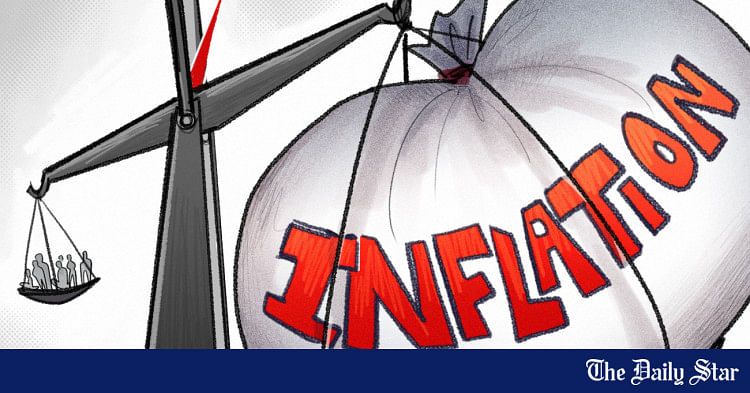FILE ILLUSTRATION: REHNUMA PROSHOON
“>
FILE ILLUSTRATION: REHNUMA PROSHOON
As Bangladesh approaches the fiscal year (FY) 2025-26, the country stands at a critical juncture. The interim government is set to unveil a new national budget, which is expected to reflect both the pressing need for economic stabilisation and structural reform. With the economy grappling with high inflation, low revenue mobilisation, rising unemployment, persistent inequality, and the impending graduation from Least Developed Country (LDC) status, the upcoming budget is poised to address these multifaceted challenges.
The formulation of the FY2025-26 budget occurs against a backdrop of significant economic and political upheaval. The ousting of the previous government in August 2024, following mass protests, led to the establishment of an interim administration on August 5, 2025, tasked with steering the country through turbulent times.
This is reflected in the World Bank’s revised economic growth forecast for Bangladesh which dropped to 3.3 percent growth of Gross Domestic Product (GDP) for FY2024-25, marking the lowest rate in 36 years. This reduction is attributed to high inflation, reduced investment, a weak financial sector, and political instability. As of April 2025, the point-to-point inflation rate stood at 9.17 percent, with a 12-month average of 10.21 percent. Although this reflects a decline from last month’s 9.35 percent (point-to-point) and 10.26 percent (12-month average) respectively, inflation is still high, persisting for almost three years now. To combat inflation, the central bank has maintained a tight monetary policy, keeping the policy rate at 10 percent. These economic challenges are compounded by the upcoming graduation from LDC status in 2026, which will result in the loss of various flexibilities, including the loss of preferential market access for Bangladeshi products in developed and some developing country markets and access to finance at flexible terms.
Amid these challenges, exports have shown resilience. Export receipts during October-December 2024 increased by 5.1 percent compared to July-September 2024 and by 20.2 percent compared to October-December 2023. This is due to increased export receipts from readymade garments, jute and jute manufacturers, and fish and shrimps. Despite these gains, the readymade garment sector could face headwinds due to new US tariffs and shifting global demand, potentially impacting future export performance.
In a departure from previous expansionary budgets, the interim government plans to present a contractionary budget totalling Tk 7.90 lakh crore for FY2025-26, down from Tk 7.97 lakh crore in the current FY2024-25. This reduction reflects a strategic shift towards fiscal prudence in response to mounting economic pressures. The projected budget deficit is expected to be equivalent to about 4.6 percent of GDP. To finance this deficit, the government plans to rely on a combination of foreign borrowing, bank loans, and savings certificates. Over half of the deficit is expected to be covered by external sources. The government will have to be cautious in bank borrowing as it will increase its debt burden. Besides, funds should be available to the private sector whenever needed.
One of the challenges, as in the previous years, will be the financing of the budget from domestic sources as Bangladesh’s tax-to-GDP ratio remains one of the lowest globally, which is below 8 percent according to government data. This significantly constrains the government’s fiscal capacity. To address this, the National Board of Revenue (NBR) has set a revenue collection target of Tk 4.99 lakh crore for FY2025-26. The government plans to broaden the application of the standard 15 percent value-added tax (VAT) rate and reduce tax exemptions. The government aims to generate additional revenue through new tax measures and administrative improvements. However, for efficient and enhanced tax collection, the government must initiate several reforms. Key initiatives to enhance revenue mobilisation include the separation of tax policy and administration within the NBR to reduce conflicts of interest and improve efficiency. Automation of NBR and skilled human resources are other necessary measures. Without deep reform measures, tax evasion cannot be controlled. Therefore, sufficient resource allocation should be made to enhance the institutional capacity of the NBR.
Controlling inflation should be a top priority for the interim government. The new budget plans to reduce inflation to 6.5 percent by the end of FY2025-26. To achieve this, fiscal and monetary policies must be aligned. Fiscal policy should be designed in a way that ensures adequate allocations are made to priority sectors while pursuing a contractionary fiscal policy. Fiscal prudence should be ensured by avoiding excessive borrowing from the banking sector. To control inflation, the government should also closely monitor markets, investigate market manipulation, and enforce anti-trust laws with a zero-tolerance policy to prevent price gouging and ensure fair competition. The allocation for social safety net should be increased to protect vulnerable people.
In the current context, the general population expects a budget that addresses their immediate economic hardships, particularly high inflation and unemployment. There is also a strong desire for increased transparency and accountability in government spending, as well as effective implementation of development projects. The public also expects the government to take decisive action against corruption and inefficiency, which have historically plagued budget execution. The interim government is in an advantageous situation to set an example by raking such action since this government has no electoral compulsion.
The FY2025-26 budget presents a critical opportunity for Bangladesh to recalibrate its fiscal policies and lay the groundwork for sustainable economic growth. By focusing on revenue mobilisation, inflation control, and strategic investments in key sectors, the interim government can navigate the current economic challenges and set the stage for a more resilient future. The success of this budget will depend on the government’s commitment to transparency, accountability, and the effective implementation of its proposed measures.
Dr Fahmida Khatun is the executive director at the Centre for Policy Dialogue.
Views expressed in this article are the authors’ own.
Follow The Daily Star Opinion on Facebook for the latest opinions, commentaries and analyses by experts and professionals. To contribute your article or letter to The Daily Star Opinion, see our guidelines for submission.




